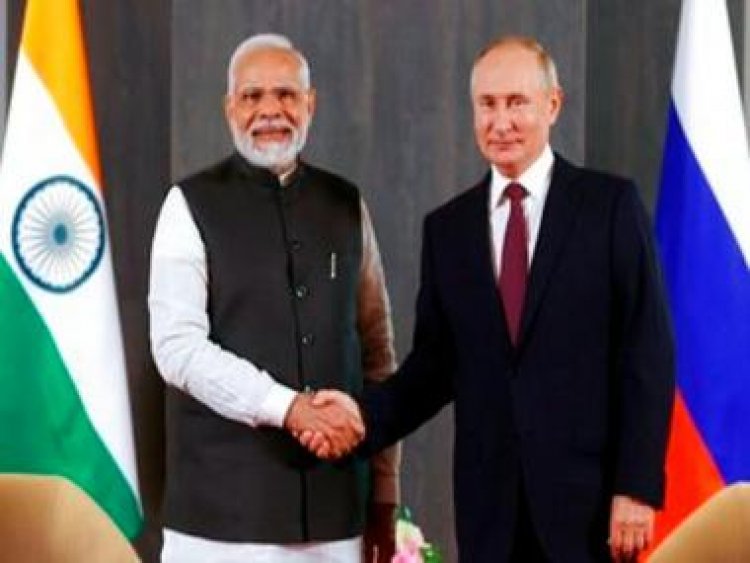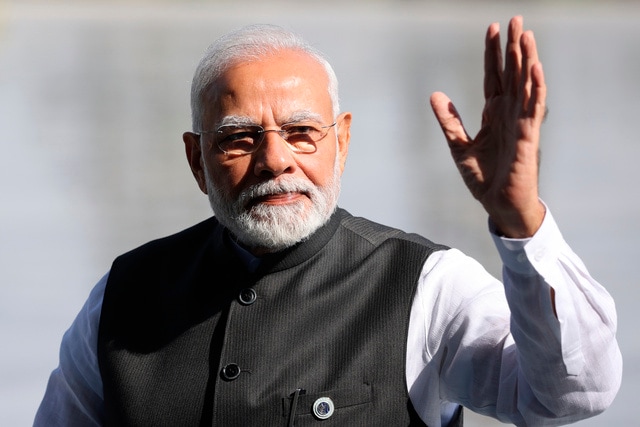Samarkand and after: India and Narendra Modi have to do more of the balancing act
Samarkand and after: India and Narendra Modi have to do more of the balancing act

In what definitely was an uncoordinated move, India and China ticked off Russia on the sidelines of the Shanghai Cooperation Organisation’s (SCO) summit with Moscow acknowledging that it understood their concerns. Yet, among the top three leaders present at the summit, Indian Prime Minister Narendra Modi stood out by not complicating things as much as Russia’s Vladimir Putin and China’s Xi Jinping did in their views about the Western world — that too in their speeches at the summit proper.
“I know today’s era is not of war. We discussed this issue with you on phone several times, that democracy, diplomacy and dialogue touch the entire world,” Modi said in Hindi in his opening remarks at the Putin bilateral. This part of his interaction with the Russian leader was televised — for the whole world to watch. Putin’s opening remarks at the bilateral meeting too were televised live.
Though what transpired behind closed doors is not known, Modi said on TV that he would discuss with Putin “how we can move forward on the road of peace in the coming days”, and would also understand Russia’s viewpoint. “Today the biggest worry before the world, especially developing countries, is food security, fuel security… fertilisers. We must find ways to (solve) these problems and you will also have to consider it,” he said.

With this, Modi was taking the focus away to cover global humanitarian considerations that are linked as much to the Ukraine War as the Covid pandemic before it. The reasons are not far to seek. On the one hand, India had to deviate from the fine balance it had struck in international affairs to tilt towards Russia, even though on the commercial front.
Cheap Russian oil did the trick for Moscow. At the same time, India is also dependent on Russia and Ukraine on the food front. Owing to difficulties on this front, New Delhi has since free export of major agricultural produce. This in turn has a domestic connotation, arising out of widening balance-of-trade, overall. In the international arena, it is faced with WTO cases for such a ban.
Defining phrase?
However, there were enough positives in Modi’s televised remarks on the gains of bilateral ties with Moscow, going back to the days of the erstwhile Soviet Union (without naming the latter, of course). He underscored his close personal ties with Putin from his own days as Gujarat chief minister in 2001, and India’s strategic relationship with Russia, which he said was an ‘unbreakable friendship’ that has lasted decades.
“Ties between India and Russia have grown manifold. We give importance to the relationship as we have been friends who have stayed together for many decades and the world knows what Russia’s relations with India have been, and what India’s relationship with Russia have been,” Modi said at the first bilateral after the commencement of the Ukraine War earlier this year.
Modi asserted that the ‘world knows this is an unbreakable friendship’. Yet, his earlier reference to ‘democracy’ in the context of India’s hopes for a dialogue-based solution to the Ukraine war would have been noticed equally so, as much in Moscow as in Western capitals.
Yet, frankness lay as much in sending out a message to the West that they needed to make no new interpretations to his summit visit and also to sideline meeting with Putin, among others, as to what he needed to, and told, the Russian leader. It’s all in the wake of the Ukraine War and New Delhi’s refusal to join them in sanctioning Russia, which as in the past remained a Western initiative, where they expected the likes of India to sign in.
Yet, for the second time in about a month — and post-Samarkand, this time — India voted against Russia to allow Ukraine President Volodymyr Zelenskyy to address the UN Security Council (UNSC) through video-call. The two votes, unlike earlier ones against Russia, were not substantive, but only procedural in nature.
In the post-Samarkand weeks, it needs to be seen if the West would move another substantive motion against Russia at the UNSC, and if India would continue to abstain — so did China — one more time. That would be a defining moment in India’s bilateral ties with Russia.
Of course, India did benefit from cheap Russian oil. Here again, Saudi Arabia has marginally regained its second place from Russia after three months, as India’s second largest oil-supplier. Iraq continues to be at number one place. Incidentally, India’s External Affairs Minister S Jaishankar was on his maiden, three-day visit to Saudi Arabia in his current avatar, before joining Modi to Samarkand.
Return and call?
Putin, who spoke before Modi and referred to the prime minister as a ‘dear friend’ and greeted him a day before his birthday, said he knew about India’s position and ‘concerns’ on the Ukraine War. ‘We want all of this to end as soon as possible. But…the leadership of Ukraine has…refused to engage in the negotiating process. They said that they want to achieve their objectives…on the battlefield militarily,’ he said.

It now remains to be seen if Modi, on return home, would talk to Ukraine President Volodymyr Zelenskyy, to communicate his impressions from Samarkand, and also convey in person what Putin had stated in private. As may be recalled, in the early stages of the war, Modi had held telephone conversations with the two warring leaders, and proposed direct talks (as the only way out) to end the conflict (when it was still young).
Should it happen, India and PM Modi especially would be in the driver’s seat, whatever the way the Russo-Ukraine negotiations of the kind ended. During early negotiations between the two sides even as the war had commenced and Russia was recording early victories, New Delhi’s name came to be mentioned as among the reasons for the two sides to confer.
Questions and concerns
Modi was not alone in saying as much to Putin on his face. Earlier, China’s Xi too had said similar things, going by Putin’s public observation. In a rare admission of different approaches between the two anti-West leaders on the war, Putin told Xi that he understood the other’s ‘questions and concerns’ in the matter. It is unclear yet if what Xi conveyed to Putin flowed from Russia’s recent battle-front reversals or was there anything more to it.
***
Also Read
SCO Summit: India makes its presence felt at the otherwise lacklustre Samarkand meet
SCO Summit: Group focused on practical cooperation to deal with terrorism, says Vinay Kwatra
***
The Russian leader hailed the ‘balanced position of our Chinese friends on the Ukraine crisis’ and offered to ‘explain in detail our position” on Ukraine. Putin’s comments too were televised briefly, in which he came down heavily on the ‘provocations by the US and its satellites in the Taiwan Strait’ — an issue closer to the hearts of Xi and China.
Putin is an ‘old friend’, said Xi. ‘China is willing to work with Russia, display the responsibilities of the major powers, and play a leading role to inject stability and positive energy to a world in chaos,’ he said, indicative of his nation joining forces with Russia, to stave off the West, especially the US — whether or not it is possible is another matter.
Forming ‘small circles’
In what at times is described as an ‘Asian summit’ or ‘Eurasian summit’, the Putin-Xi combo sought to convert it into an ‘anti-West alliance’, existing or emerging. Modi might have pre-empted the hopes and beliefs of any Indian endorsement to their ideas, through the televised part of his bilateral with the Russian leader.
Other summit leaders, including Pakistan Prime Minister Shehbaz Sharif too stayed away from controversial subjects, sticking to the summit’s agenda-points that centred on SCO connectivity. However, no one talked about China’s BRI, where India is the lone non-participant from among SCO nations.
In his summit talk, for instance, Xi said, it was time to reshape the international system and ‘abandon zero-sum games and bloc politics’. Leaders should ‘work together to promote the development of the international order in a more just and rational direction,’ he said.
Without naming the West or any nation in particular, Xi asked SCO member-nations to ‘guard against attempts by external forces’ to instigate ‘colour revolutions’ or interfere in their affairs, in a veiled criticism of the West.
Likewise, without naming the US-driven Quad and Indo-Pacific, in which India is a member, Xi criticised the ‘obsession with forming a small circle’ and called on the SCO group to work together to make a more just international order.
New interpretation
Xi’s remarks did not directly mention the West, but underlined how both Beijing and Moscow see the SCO as a key vehicle to push back against Western countries. He sought to give a new explanation/interpretation to the Cold War era ideological division between the global West and East on the one hand, and the global North and the South on the other.
At the summit, Xi said, ‘The world today is not a peaceful place…Rivalry between two sets of policy choices — unity or division, cooperation or confrontation — is getting more acute… The SCO should seize the opportunity and step up its work to expand the ranks of cooperation and augment the effective force for international equity and justice.’
According to him, ‘obsession with forming a small circle can only push the world toward division and confrontation’ and the SCO members ‘should remain firm in safeguarding the UN-centred international system and the international order based on international law, practice the common values of humanity and reject zero-sum game and bloc politics.’
“We should guard against attempts by external forces to instigate ‘colour revolution’, jointly oppose interference in other countries’ internal affairs under any pretext, and hold our future firmly in our own hands,” the Chinese leader said.
In his turn, Putin hailed the growing influence of countries outside the West, slamming what he called ‘instruments of protectionism, illegal sanctions and economic selfishness’. He claimed that the ‘growing role of new centres of power who cooperate with each other… is becoming more and more clear.’
India’s inputs
The Western media has since hailed Modi for his frank/bold statement to Putin. Earlier, they were critical of India taking a balanced approach. Like their governments — and at times even more — they are conditioned by decades of ‘Us vs Them’ syndrome.
The West wants India on their side. They acknowledge India’s consistent, and at times calibrated economic growth and political importance, in the post-Cold War era, triggered especially by the nation’s economic reforms saga. But they are unable to think of India outside of their Cold War concepts.
Hence, they were/are unable to and at times unwilling to seek and consider India’s inputs before taking momentous decisions that also affect the nation in very many ways. The US entry into Afghanistan after 9/11, their continued ‘occupation’ of the nation for 20 years, followed by hurried and unscheduled withdrawal, almost overnight was a recent case in point.
India possibly did not expect the US to repeat the folly, this time in Europe, pushing it into a war that its NATO allies too did not want — but could not escape from, since, albeit through indirect supply of weapons for Ukraine!
The writer is a Chennai-based policy analyst and commentator. Views expressed are personal.
Read all the Latest News, Trending News, Cricket News, Bollywood News,
India News and Entertainment News here. Follow us on Facebook, Twitter and Instagram.
What's Your Reaction?

























































